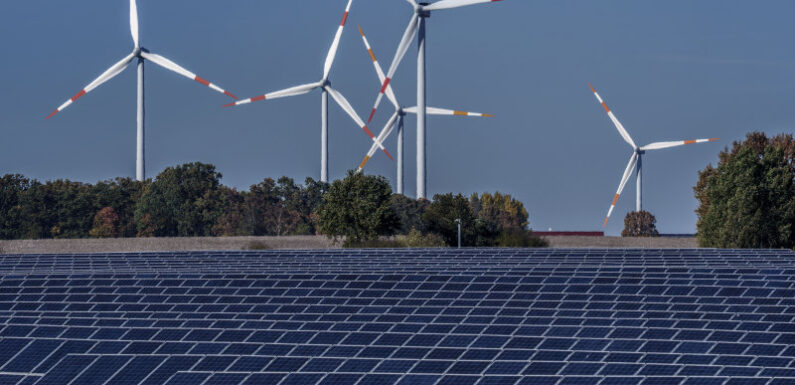
Save articles for later
Add articles to your saved list and come back to them any time.
Business leaders and the nation’s three biggest energy companies will not back the Coalition’s push for the Albanese government to abandon its 2030 clean energy target as David Littleproud and Peter Dutton attack the rollout of wind and solar across the country.
Power giants AGL, Origin Energy and EnergyAustralia – the largest owners of Australia’s remaining coal-fired power stations – have joined influential business groups in urging the government to stick with its ambitious pledge to shift the grid to 82 per cent renewable energy by the end of the decade.
Business groups are urging the Coalition not to reignite the climate wars.Credit: AP
The Albanese government has pledged to more than double the amount of power the electricity grid sources from renewables to 82 per cent by 2030 to help achieve its target of cutting greenhouse emissions 43 per cent by the same deadline.
Energy experts are increasingly worried the target will be difficult to achieve, as time is running out to build enough renewable generation and storage projects and thousands of kilometres of new high-voltage transmission lines to connect far-flung renewable energy zones to major cities, as farmers and landholders fight plans for new poles and wires on their land.
Opposition Leader Peter Dutton is calling for Australia to deploy emerging nuclear-power technology, while Nationals leader David Littleproud has criticised what he calls the government’s “reckless race to renewables” and asked for the 82 per cent target to be paused and reconsidered.
“We won’t be part of any future Coalition government federally that doesn’t back pausing this and planning a proper energy policy that protects farmers, protects prime agricultural land and remnant vegetation that’s being recklessly destroyed in this reckless race to 82 per cent,” Littleproud said.
But Business Council of Australia Jennifer Westacott said the government must stick to its pledge, and work with the community and industry to ensure the clean energy transition was kept on track.
“We need to stay the course,” Westacott said. “What is needed now is a strong focus on removing barriers so we can make this happen.”
Frank Calabria, chief executive of power and gas giant Origin Energy, declared Australia must not walk away from the renewable energy target, despite how difficult the challenge might be.
“It’s only by setting ambitious targets that you drive action,” Calabria said. “I certainly feel that it’s a very challenging target because of what needs to be done, but I think we should hold targets and go after them.”
AGL chief executive Damien Nicks agreed that Australia’s 2030 target provided critical “certainty” that would help drive the change and innovation required.
“The energy transition is the most significant transition Australia has ever attempted and requires all of us – the energy industry, all levels of government and regulators, and the Australian community – to work together to meet Australia’s emissions-reduction targets,” he said.
EnergyAustralia chief Mark Collette said reaching 82 per cent renewables by 2030 seemed a “big ask … but a target like this focuses the nation on how to accelerate the development of renewables and the infrastructure associated with it”.
The Australian Industry Group, which represents more than 60,000 businesses with more than 1 million employees, said Australia needed to “get its skates on” in accelerating the build-out of vital new energy infrastructure because the old energy system was “crumbling around us”.
“Targets exist to stretch us, and striving to meet them matters,” chief executive Innes Willox said.
Dutton is calling for the deployment of what are known as small modular reactors to reduce emissions from the electricity sector, instead of renewables that require a vast array of new power lines to link wind and solar farms into the cities.
“The government’s renewables-only policies got us on a pathway to see lights go out, and if you think that your power bills have already gone up significantly under Labor, wait for the bill to come when they spend over $100 billion on 28,000 kilometres worth of new poles and wires,” Dutton said, this week.
Littleproud is calling for a Senate inquiry or summit into renewable energy and a national debate on removing Australia’s moratorium on nuclear power.
Cut through the noise of federal politics with news, views and expert analysis from Jacqueline Maley. Subscribers can sign up to our weekly Inside Politics newsletter here.
Most Viewed in Politics
From our partners
Source: Read Full Article
